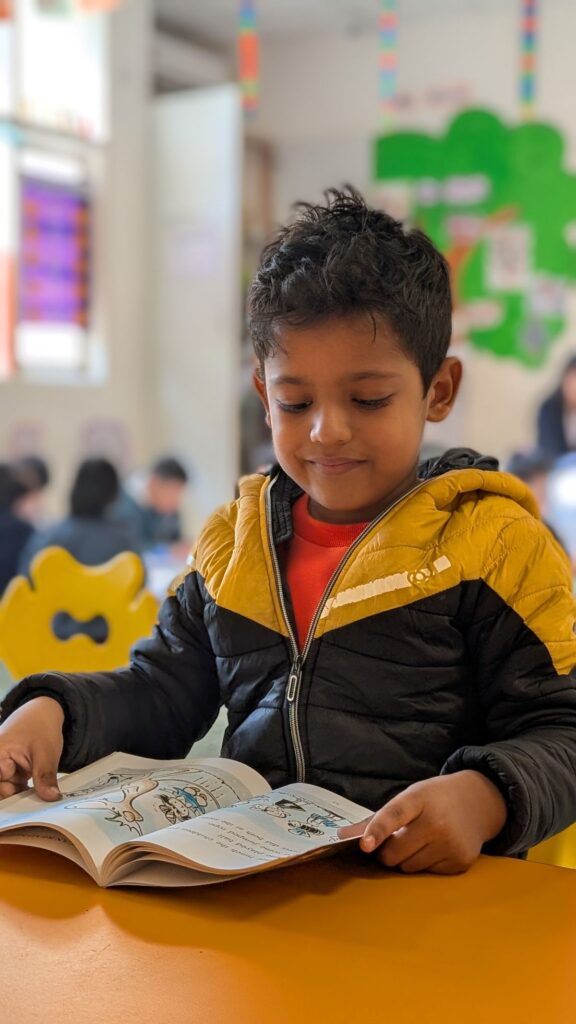Technological advancements continually evolve our reading habits and information consumption. As digital media is more prevalent, screen time is replacing conventional reading habits. Although knowledge is now more easily accessible thanks to digital devices, many experts are worried about how screen time affects literacy development, particularly in young children. Vega Schools, one of the top schools in Gurgaon, emphasizes the importance of striking a balance between screen time and traditional reading to nurture strong literacy skills in preschoolers.
Digital gadgets can be a useful teaching tool, but too much screen time can hinder reading development. According to studies, kids who spend more time on screens are more likely to struggle with attention and have poorer reading comprehension skills. Screen time and traditional reading must be balanced to guarantee that kids acquire solid literacy skills.
Traditional reading
Many people like the physical feel of reading on paper. The book feels heavy in the hands, the pages can be turned, and the paper and ink can even be smelled.
Because it requires us to set aside time and space to sit down and read, traditional reading can be a more deliberate activity.
Reading on paper helps people recall knowledge better, according to research. This is due to the fact that reading on paper stimulates more senses, such as touch and scent, which might aid with memory retention.
Reading on screen
It is more convenient to read on a screen. Readers can use it to carry a library of books with them wherever they go, and they can change the lighting and text size to make reading more comfortable for their eyes.
The option to read on the go or during little pauses during the day, however, makes digital reading more flexible. But this can also result in a propensity to read quickly or superficially rather than carefully.
Now let us talk about how we can inspire the younger generation to develop reading habits –
1. Start with yourself
Since kids often imitate their parents’ behaviors, if they see you constantly using electronics, watching TV, and using social media, they will probably assume it’s okay to do so. However, if they see you making time to read and talk about it, they will be motivated to read more, so the change starts with you.
2. Take them to book fairs and help them choose books
Book fairs have become very common, and a lot of schools are also organizing to boost reading habits in kids.
As parents, you can take them out, help them choose books, and let them explore books and authors that they like. This makes reading and buying books an experience that they will cherish.
3. Watch movies with them inspired by their favorite books
Watching the movie adaptation of books that they have read or already love helps them connect more easily and get excited to read. This helps them connect with the characters visually as well as in the form of traditional books.

4. Restrict screen time
It is the responsibility of parents and teachers to keep an eye on their kids’ screen time and make sure they aren’t using electronics excessively. In addition to encouraging kids to participate in other activities like sports, outdoor play, and artistic endeavors, they can impose screen time limits.
When people are aware that they have a set amount of time, they will utilize it to accomplish their goals rather than wasting it browsing through pointless material. As a parent, make sure your child adheres to the time restriction. Setting appropriate limits is essential to striking that balance, even though it can be challenging when children begin to whine and throw tantrums.
5. Treat them like adults and discuss with them
Have a conversation with your children about responsible tech use rather than being a controlling parent. Children will understand your actions and cooperate more readily if they understand why you are doing something. Teach kids to spend quality time online and to use technology responsibly.
Additionally, educate children on the detrimental effects excessive screen use can have on their health and academic performance. The topic of online safety is another crucial one. You can’t always keep an eye on your children, especially as they become older. Teaching them to be wary of persons they meet online and what information they should never share with others without their consent is the best course of action.
Conclusion
Balancing screen time with traditional reading is crucial for fostering a love for books and building strong literacy skills in preschoolers. By modeling good habits, encouraging reading through engaging activities, and setting appropriate boundaries, parents and educators can guide children toward a balanced and enriching relationship with technology and books. Vega Schools, the best school in Gurgaon, continues to champion innovative approaches to education, ensuring students grow into well-rounded individuals with a lifelong love for learning.
Explore Vega Schools’ insights on Using Technology Wisely – Screen Time Guidelines for Young Children. Read More.
Vega Schools offers holistic education to children in Delhi NCR and is rated among the top Schools in Gurgaon. Its modern infrastructure, facilities, and experienced teachers are a big asset to the learning & development of students, be it for Nursery, Primary or Senior children making Vega Schools the best schools in Gurgaon. For information about admission please visit the Vega Schools campuses in Sector 48 and Sector 76 Gurugram.
